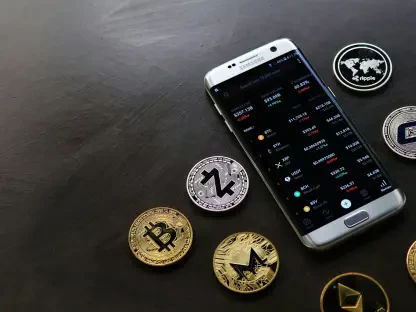Blockchain technology, often synonymous with the cryptocurrency market, extends far beyond digital currencies and has promising applications within the telecommunications sector. The need for enhanced security, improved transparency, and operational efficiency is paramount as telecommunication companies face various challenges, from cybersecurity threats to the complexities of managing interconnected devices. Blockchain’s decentralized approach and immutable record-keeping can address many of these industry challenges, making it a game-changer for telecom operators looking to future-proof their networks.
Enhanced Security for Telecom Networks
Blockchain significantly enhances the security of telecommunications networks by introducing a decentralized data storage system. Traditionally, telecom networks rely on central servers for data management, making them vulnerable targets for cyber-attacks. Blockchain disperses data across a network of nodes, minimizing these risks and enhancing network resilience. The benefit of this decentralized system is the increased difficulty for hackers to breach the data, as they would need to compromise multiple nodes simultaneously rather than a single central server.
Additionally, blockchain technology improves authentication methods within telecom networks. The technology’s inherent immutability ensures that once data is recorded, it cannot be altered or tampered with. This is particularly beneficial for user, device, and transaction authentication processes, providing a secure, tamper-proof method of verification. Consequently, the risk of unauthorized access is significantly reduced, leading to a more secure overall network infrastructure.
Encrypted communication channels are another crucial aspect of blockchain technology, offering robust security for data sharing among telecom operators, suppliers, and customers. These channels protect sensitive information from being intercepted or tampered with during transmission. With the rise in data breaches and cyber threats, incorporating encrypted communication via blockchain becomes an essential tool for safeguarding the integrity and confidentiality of telecom data.
Efficient Management of IoT Devices
Given the critical role telecom networks play in connecting billions of Internet of Things (IoT) devices worldwide, managing these devices securely and efficiently is a pressing concern. Blockchain technology addresses several inherent challenges in IoT device management through its decentralized ledger system. This system logs all device interactions and data exchanges, thereby enhancing transparency and fostering trust within IoT ecosystems.
The use of immutable records within these networks ensures that the data collected and shared among devices is trustworthy and cannot be altered. This level of data integrity is vital for the effective management and operation of IoT devices, as it prevents the manipulation of device data that could otherwise compromise network security and functionality. Blockchain provides a robust framework for maintaining continuous and reliable communication between devices.
Moreover, the automation of device management processes through smart contracts significantly reduces the need for manual intervention. Smart contracts can facilitate seamless firmware updates, device permission management, and other routine maintenance tasks. This automation minimizes the risk of human error, streamlines operations, and ensures that IoT devices are consistently up-to-date with the latest security protocols and features. Thus, blockchain not only enhances the security of IoT device management but also optimizes operational efficiency in telecom networks.
Combating Telecom Fraud
The telecommunications industry faces substantial financial losses annually due to various forms of fraud, such as identity theft, SIM swapping, and call rerouting. Blockchain technology offers effective mechanisms to mitigate these fraudulent activities, primarily through the use of immutable call records. These records ensure that call data remains unaltered, thus reducing the likelihood of fraudulent activities and increasing trust in telecom services.
Decentralized identity management is another pivotal aspect of blockchain technology that enhances network security. By leveraging blockchain for identity verification, telecom operators can implement secure and tamper-proof methods to authenticate users. This helps in preventing unauthorized access to the network, which is a common vector for fraudulent activities. The transparency and security provided by blockchain-based identity management systems are crucial in protecting both the telecom infrastructure and its users.
Moreover, the adoption of blockchain technology in combating telecom fraud extends beyond individual users to include secure verification of devices and transactions. This comprehensive approach ensures that all elements of telecom networks, from user identities to operational transactions, are authenticated and protected. By integrating blockchain, telecom operators can significantly reduce the incidence of fraud, safeguard their revenue, and provide a more secure service to their customers.
Billing and Roaming Agreements
Billing errors and disputes over roaming charges are prevalent issues within the telecommunications industry, often leading to customer dissatisfaction and financial discrepancies. Blockchain technology can address these challenges by automating the billing process through smart contracts. These contracts ensure accurate and timely invoicing by automatically recording and reconciling usage data, thereby eliminating human errors and discrepancies that often occur in traditional billing systems.
Blockchain facilitates seamless roaming agreements between telecom operators, reducing inefficiencies and disputes. It provides a transparent and immutable record of roaming activities, which can be easily verified by all parties involved. This transparency not only enhances user experience by providing clarity on roaming charges but also fosters trust between different telecom operators.
Real-time usage and billing data provided by blockchain further enhance customer experience by offering transparent insights into their usage and charges. End-users can monitor their data consumption and associated costs almost instantaneously, reducing billing surprises and increasing satisfaction. Through these capabilities, blockchain offers a robust solution to streamline billing processes, resolve disputes efficiently, and enhance overall customer satisfaction in the telecom industry.
Streamlined Supply Chain Management
The infrastructure of the telecommunications industry is complex and requires effective supply chain management to ensure timely deployment and maintenance of network components. Blockchain technology simplifies this process significantly by enabling real-time tracking and verification of components throughout the supply chain. By monitoring the origin and movement of parts, blockchain ensures transparency and accuracy, reducing the chances of delays caused by mismanagement or fraud.
Additionally, blockchain’s immutable records prevent documentation disputes between suppliers and telecom operators. These records maintain an accurate, unaltered history of transactions and movements, accessible to all authorized parties. This level of transparency and reliability ensures that all stakeholders have up-to-date information, streamlining operations and fostering collaboration.
Blockchain also aids in compliance with industry standards and regulations, providing a transparent system for tracking and verifying the provenance and movement of components. This compliance is particularly relevant in large-scale projects like 5G deployment, where meeting regulatory requirements is crucial for successful implementation. By employing blockchain, telecom operators can enhance their supply chain efficiency, reduce operational delays, and ensure adherence to regulatory standards.
Integration with Legacy Systems
Despite the numerous benefits, the adoption of blockchain in telecommunications faces challenges, particularly concerning integration with existing legacy systems. Many of these systems were not designed with blockchain capabilities in mind, necessitating substantial technological investments and skills development for seamless implementation. Integrating blockchain requires a comprehensive overhaul and modernization of current infrastructure, posing a significant hurdle for many telecom operators.
Scalability and performance concerns further complicate the widespread adoption of blockchain technology in the telecommunications sector. Blockchain networks, particularly those using proof-of-work mechanisms, can struggle with handling high transaction volumes, leading to latency issues. This limitation makes blockchain less suitable for real-time processing and high-throughput transactions that are common in telecom operations.
Nevertheless, overcoming these challenges is essential for telecom operators to leverage the full potential of blockchain technology. Investments in technological upgrades and extensive training programs for personnel are critical steps in facilitating this integration. Furthermore, exploring alternative blockchain mechanisms, such as proof-of-stake, may help address scalability and performance concerns, making blockchain more viable for telecom applications.
Regulatory and Compliance Uncertainty
The evolving regulatory landscape surrounding blockchain technology presents another challenge for its adoption in the telecommunications industry. Different regions enforce varying rules and regulations, creating uncertainty and potentially delaying the implementation of blockchain solutions. Telecom companies must navigate these regulatory complexities carefully to ensure compliance while benefiting from blockchain’s advantages.
Collaboration with regulators and industry stakeholders is crucial for telecom operators seeking to implement blockchain technology. Developing standardized frameworks and guidelines with input from regulatory bodies can help mitigate compliance risks and provide a clearer path for adoption. This collaborative approach ensures that blockchain solutions not only meet regulatory requirements but also align with industry best practices.
Continued engagement with policymakers and industry groups is essential for telecom operators to stay abreast of regulatory changes and adapt their blockchain strategies accordingly. By fostering an environment of cooperation and transparency, the telecommunications industry can effectively address regulatory challenges and unlock the full potential of blockchain technology.
Synergies with Other Technologies
The potential of blockchain in telecommunications is further amplified when combined with other cutting-edge technologies such as 5G and artificial intelligence (AI). Dynamic network management using blockchain can optimize resource allocation within 5G networks, leading to improved efficiency and performance. This synergy allows for more effective routing, bandwidth allocation, and overall network utilization, providing enhanced service quality to consumers.
AI-powered insights, when integrated with blockchain data, offer predictive maintenance analytics that can preemptively identify and address potential issues before they escalate into significant problems. This proactive approach to network maintenance not only reduces downtime but also extends the lifespan of telecom infrastructure. By leveraging blockchain’s immutable records alongside AI’s analytical capabilities, telecom operators can achieve more reliable and efficient network management.
Blockchain-based cloud services also present a compelling solution for secure data storage, benefiting both telecom operators and their customers. These services provide enhanced security and privacy, safeguarding sensitive information from breaches and unauthorized access. The integration of blockchain with cloud technology ensures that data is stored in a decentralized and tamper-proof manner, offering a secure alternative to traditional cloud storage solutions.
Global Adoption Trends
Telecom operators around the world are increasingly exploring blockchain applications to improve their operations and services. In Europe, for instance, blockchain is being utilized for secure identity verification, which reduces onboarding times and enhances the overall customer experience. This application demonstrates how blockchain can streamline processes and offer tangible benefits to both operators and users.
In Asia, telecom companies are testing blockchain technology for secure 5G slicing and enterprise connectivity. These initiatives aim to leverage blockchain’s security features to create more reliable and secure network partitions, catering to the specific needs of various enterprises. By embracing blockchain, Asian telecom operators are at the forefront of innovation, setting new standards for network security and efficiency.
Meanwhile, in North America, blockchain-powered marketplaces are being developed for trading unused network capacity. This innovative approach allows telecom operators to optimize their resources, reduce waste, and generate additional revenue. These examples highlight the global recognition of blockchain as a transformative tool capable of revolutionizing the telecommunications sector.
Insights from the Financial Sector
The financial sector’s experience with blockchain technology provides valuable insights for telecommunications operators looking to adopt similar solutions. Blockchain has proven effective in ensuring transaction transparency and integrity, reducing fraud, and building trust within financial markets. These benefits are directly applicable to the telecommunications industry, where secure and transparent transaction management is crucial.
Telecom operators can draw lessons from the financial sector in implementing blockchain to secure network transactions and data exchanges. By adopting blockchain, they can enhance operational efficiencies, reduce the risk of fraud, and improve overall service quality. The financial sector’s success with blockchain demonstrates its flexibility and applicability across various industries.
By learning from the financial sector’s experience, telecom companies can better navigate the challenges and opportunities presented by blockchain technology. This strategic adoption of blockchain can position telecom operators to meet the evolving demands of their customers and maintain a competitive edge in the rapidly changing digital landscape.
Conclusion
Blockchain technology, often linked with the cryptocurrency market, goes well beyond just digital currencies and shows significant promise in the telecommunications industry. Telecommunication companies encounter numerous hurdles, ranging from cybersecurity threats to the intricate management of interconnected devices. The push for enhanced security, greater transparency, and operational efficiency has never been more critical. Blockchain’s decentralized nature and immutable record-keeping present novel solutions to these challenges. By recording transactions in a way that makes them direct and verifiable, blockchain ensures security and accuracy. This can drastically reduce the risks of fraud, data breaches, and unauthorized access. Additionally, it offers transparent and tamper-proof logging of transactions and activities, which is crucial for audits and compliance. By streamlining these processes, telecommunication companies can improve their operational efficiency and trustworthiness. Blockchain is becoming a vital tool for telecom operators aiming to safeguard their networks and stay ahead of future advancements.









